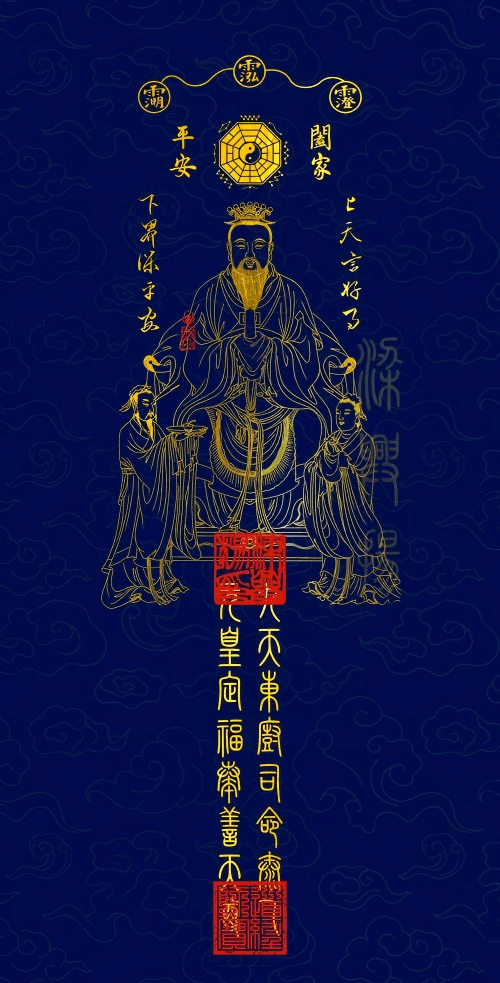‘无好家神通外鬼’
‘无好家神通外鬼’ is a Teochew idiom,the literal meaning is that the gods worshipped at home not only do not protect the worshippers but also collude with ghosts outside to harm the worshippers.Refers to someone who is disloyal and treacherous. This saying originates from a folk legend.
‘无好’ means not good.’家神’ means the gods worshipped at home.’通外鬼’ means collude with ghosts outside.
Practice how to speak the sentence in Teochew dialect as below:
This story begins with a deity worshipped by the Teochew.
Lord Siming’s story
Lord Siming’s Birthday
The Teochew people have a customary festival called Lord Siming’s Birthday, which falls on the 24th day of the seventh lunar month. Dried taro is offered as an offering. How did this custom come about?
Long ago, a path connected the heavens and the mortal world. Not only could the gods visit the mortal world, but mortals could also ascend to heaven, creating a mingled world of humans and gods.
Separating Heaven and Earth
When Li’s father became emperor, he determined to change this situation. He named his eldest son Nanzheng, who would hold up the heavens. His second son, Fire God, would press down on the earth. Over time, heaven and earth separated.
The Silent Fire God
Later, Nanzheng became emperor, commonly known as the Jade Emperor. Fire God was Li. The Jade Emperor ordered the mortal gods to report to the heavens on the 24th day of the twelfth lunar month at the end of the year.
Once, after the gods had finished their oral presentation, Li remained silent. The Jade Emperor, perplexed, asked, “Brother, how have your subjects been these past few years?” Li replied slowly, “I don’t know where to begin. I simply wish for food, a few worries, and a life of luxury.”
Fire God Became Lord Siming
The gods present laughed heartily. The Jade Emperor, amused as well, thought for a moment, and said to Li,
“Very well, I will grant your wish. I decree that the mortal God of Fire be renamed Siming, and your shrine be placed on the stove. On the first and fifteenth day of each month, people must kneel before Siming, and wives must bathe in the fire room (the kitchen). You will be entrusted with this position.”
Lord Siming wrote as ‘司命公’ in Chinese,who is a lord responsible for the family’s food and well-being.Also named ‘Kitchen God'(灶公).
With this, Li’s three requirements were fulfilled. He happily ascended to the mortal world as Lord Siming.

Customs of Worshiping Lord Siming – Silencing Lord Siming
Because Li had learned about the many trivialities of life in every household,
Lord Siming knew everything about people’s cooking, their private conversations, and their romantic affairs.
People feared he would tell the truth when he ascended to heaven on the 24th day of the 12th lunar month.
On his birthday, the 24th day of the 7th lunar month, they sealed his mouth with dried taro. On the 24th day of the 12th lunar month, when he ascended to heaven, people offered him soft Kueh early in the morning.
The purpose was to seal his mouth so that he wouldn’t open it when he ascended to heaven, preventing him from speaking nonsense.
A Poor Family
Legend has it that there lived a poor family in a certain village. Their life was extremely difficult, often lacking rice and food. During festivals like the Lunar New Year, they could only borrow small sums from others to make ends meet.
Angry Lord Siming’s Revenge Plan
Lord Siming always felt that his offerings were too meager, unlike the richer families who had meat and vegetables. The more he thought about it, the angrier he became.
One day, the King of Hell wanted to find a scapegoat. Luckily, Lord Siming learned of this and felt his chance for revenge had arrived.
He went so far as to “recommend” this poor family to the ghost messenger.
Lord Siming’s Abandoned Deity Tablet
Hatefully, this “household deity” not only failed to bless the family, but instead colluded with the ghost messenger to harm them. Fortunately, the poor man learned of Lord Siming’s actions in a dream. Upon waking, he was furious and threw the Kitchen God tablet out the door, cursing, “‘无好家神通外鬼’!”


Leave a Reply